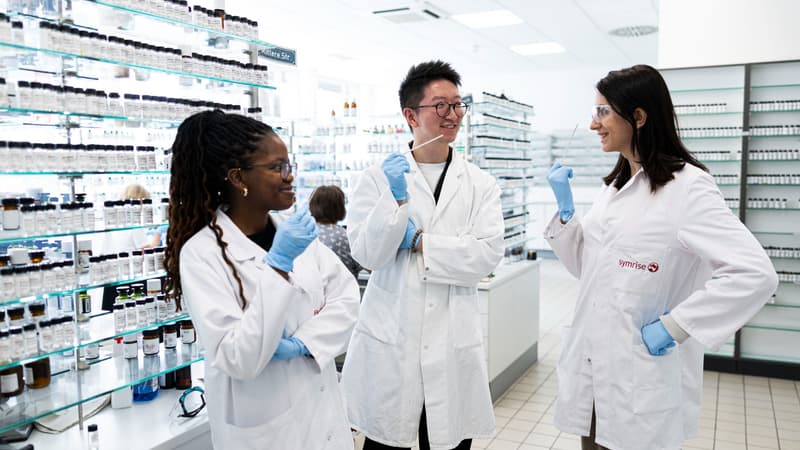In the Laboratories of the German Symrise chemical, the smell of citrus shows the blouses of a handful of future “nose” formed to create laundry or shampoo perfumes whose complexity has nothing to envy to the most luxurious fragrances.
These unknown laundry heroes that smell like a good influence of the emotions of millions of consumers for which the smell of an item is often a decisive purchase criterion.
A knowledge that can be learned at the school of perfume integrated in multinational simulation, one of the five largest world manufacturers of fragrances and aromas for domestic, body or food products.
At the company’s headquarters in Holzminden, near Hanover (center of Germany), every morning it gives rise to the same exercise: blindly recognize a dozen aromas among dozens of bottles labeled with raw materials: Calone, Aldehyde, Rosa and other synthetic muses.
“It’s like granting a musical instrument” before playing, Alicia from Benito Cassado, 32 years -old Spanish, former professional pianist converted into perfume studies.
When he was a teenager, he composed fantasy aromas to give his own poems and music songs. Today, what matters to “create strong, beautiful and powerful aromas” for customers, summarizes.
Recognize 500 smells
The complexity of the profession surprises, justifying a three -year formation: the smell of a softener can understand “up to 80 ingredients, much more than a luxury body fragrance,” says Attiya Setai, 27 -year -old South African student.
A good “nose” should be able to recognize more than a thousand blind aromas “, but knowing about 500 issues for heart is enough for most daily work,” explains Shangyun Lyu, a 31 -year -old Chinese student.
When he was a child, he assimilated Jasmine’s aroma to a pretty flower. Today, he says “Recognizes the chemical molecules that form perfume.”
Despite the closest milligram, mix, feel, begin again … Students have reproduced the formulas of existing products to understand their structure and go further: “There is a truth in the heart of each perfume, but also innovation to bring,” explains Alicia. He quotes materials such as carnation or rose that “may seem old, but that can always be reinvented.”
Create under restrictions and stick to the tastes of each market
In their creative impulses, the “noses” must deal with regulations: “It is often necessary to replace the ingredients prohibited by new more durable molecules,” says Attiya. For example, the Lilial, appreciated by its Lily of the Valley but recognized as allergen of the skin, has been prohibited since 2022 in the European Union.
Another problem, the perfumes of domestic and cosmetics products must adhere to the tastes of each market:
In China, a shampoo inspired by Coco Mademoiselle, Chanel, and enriched in Pachulí’s aroma has attracted a young clientele, while this style seems outdated in Europe.
The environment also plays an important role in the development of industrial perfumes. Symrise uses wood resins not used by the paper industry to extract aromatic raw materials, an “economic and ecologically judicious” choice, says the master perfume, Marc Vom Ende, 56, which supervises young recruits.
Only 5 noses by promotion
Beyond raw materials, the profession of the perfume is mostly a teamwork: “It is crucial that several people feel a perfume, because each perceives it differently.”
To accompany them, artificial intelligence now comes into play, helping to predict which fragrances could meet success. But “in the end, the nose will always have the last word,” says Marc vom Ende.
The apprentices, five for the promotion that has just completed their training, will fly to put their “nose” at the service of the group, internationally established: Alicia in Mexico, attracted by Sao Polo and Shangyun to New Jersey.
The profession remains rare: around 500 perfumers exercise in the sector, including 80 in Symrise, which has 13,000 employees and markets 30,000 products: half of the fine and industrial perfumes, half of the food aromas, the second pillar of the group.
Source: BFM TV


